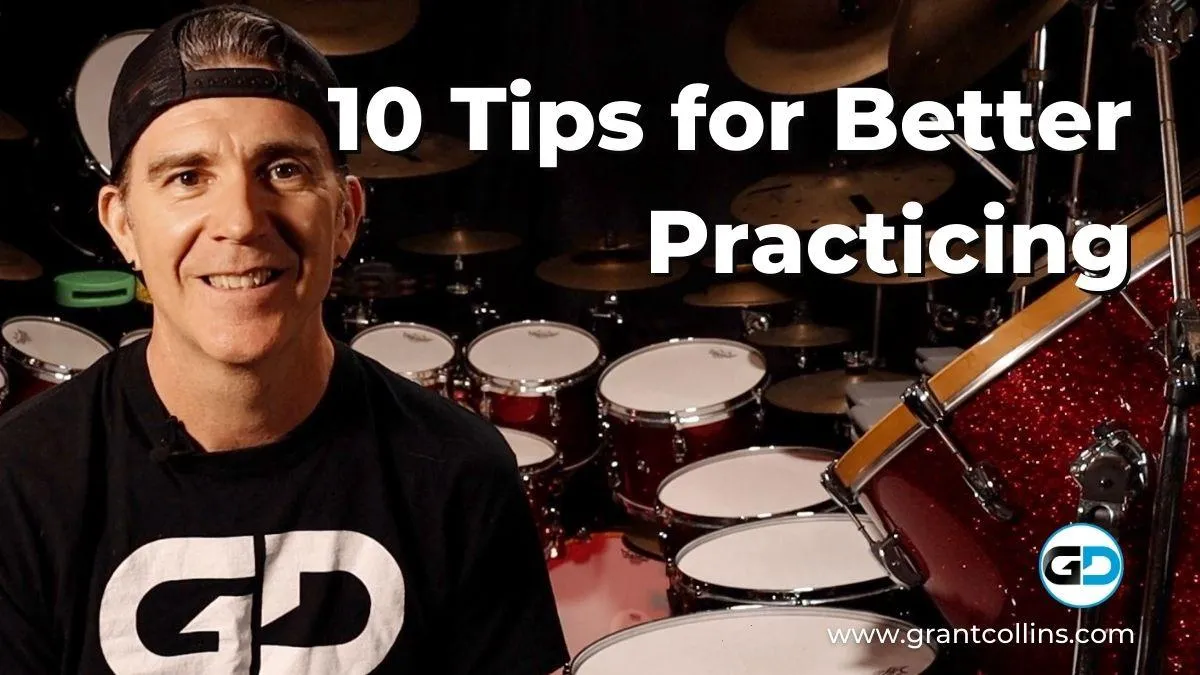ACADEMY MEMBERS
LEARNING TIME
with


10 Tips for Better Drum Practicing
We’re all busy so I’ve got my 10 top tips to help you maximize your practice time and advance your playing.
Drums are such a fun instrument to play and there’s nothing like getting behind your kit and playing your favorite grooves and fills. When we do want to get better, we do need to practice. We’re all busy so I’ve got my 10 top tips to help you maximize your practice time and advance your playing.

1. Set specific and achievable goals for your practice sessions. This will help you stay focused and motivated.
The goals you set for your practice sessions will depend on your current skill level and what you want to achieve as a musician. Here are a few ideas for goals you might set:
Learn a specific song or piece of music
Improve your accuracy and speed when playing a particular technique or pattern
Develop a new skill, such as improvising or sight-reading
Increase your overall proficiency on your instrument with core skill workouts
Prepare for an upcoming performance or audition
It's important to make your goals specific and achievable. For example, instead of setting a goal to "improve your playing," you could set a goal to "learn two new sticking patterns and play them at 120 bpm." This will give you something specific to work towards and will help to track your progress.

2. Create a consistent practice schedule and try to stick to it as closely as possible. This will help you make progress more efficiently.
Here are a few tips for creating a more consistent practice schedule:
Set aside a specific time each day for your practice. Choose a time that works best for you and try to stick to it as closely as possible.
Make a plan for what you want to work on during each practice session. This will help you stay focused and make the most of your time.
Avoid scheduling practice sessions at times when you know you'll be too busy or distracted.
Use a planner or calendar to keep track of your practice schedule. This will help you stay organized and ensure that you don't double-book yourself.
Be flexible and don't be too hard on yourself if you need to adjust your schedule from time to time. Life happens, and it's okay to be flexible.
Reward yourself for sticking to your practice schedule. This could be something small, like jamming along to your favorite songs after a practice session.
Take advantage of any gaps in your day. With the workouts inside Grant Drums Academy you can get focused and productive practice sessions without distractions. If you’ve got 10 mins free, you can get in a workout!
By creating a consistent practice schedule and sticking to it, you'll be able to make progress more efficiently and become a better musician.

3. Start with a warm-up to get your body and mind ready for practice. This could be something as simple as stretching or playing your favorite rudiment.
It's a good idea to do a warm-up before you start practicing to get your body and mind ready for the work ahead. Here are a few ideas for things you can do to warm up:
Stretch your muscles. This will help you loosen up and prevent injury.
Play some easy exercises or patterns. This will help get your fingers moving and get your brain focused on playing.
Do some deep breathing exercises. This will help you relax and focus.
Play along with a recording at a slow tempo. This will help you get in the groove and get your timing and rhythm feeling good.
Spend a few minutes visualizing yourself playing your best. This can help you get into a positive mindset and get you excited to practice.
Remember, the goal of a warm-up is to get your body and mind ready for practice, so make sure to start slowly and gradually increase the intensity as you go.

4. Practice slowly at first to get the technique right. It's better to take the time to get things right than to rush and make mistakes.
Practicing things slowly at first is important because it helps you develop good technique and muscle memory. When you practice something slowly, you have more time to focus on the details of your technique, such as your hand position, finger placement, and timing. This will help you get things right from the beginning and prevent bad habits from forming.
Once you have the technique down, you can gradually increase the tempo and challenge yourself to play faster. This will help you build speed and endurance over time.
It's important to remember that it's better to take the time to get things right than to rush and make mistakes. By practicing slowly at first and focusing on good technique, you'll be able to make progress more efficiently and play more easily in the long run.

5. Pay attention to your posture and hand position. Good technique will help you play more easily and with less strain on your body.
Good posture and hand position are important for drumming because they help you play more easily and with less strain on your body. When you have good posture, you'll be able to move freely and comfortably around your drum set, which will allow you to play more accurately and with more control. Good hand position, on the other hand, will help you play with more power and precision, and it will also help prevent injuries.
There are a few key things to keep in mind when it comes to posture and hand position for drumming:
Keep your spine straight and avoid slouching.
Make sure your butt is planted in the drum stool without leaning forward or backward. This will give you a solid foundation and allow you to move freely.
Keep your shoulders relaxed and avoid tensing up.
Hold your sticks with a relaxed grip and make sure your wrists are loose. This will help you play with more control and power.
By paying attention to your posture and hand position, you'll be able to play more easily and with less strain on your body. This will help you make progress more efficiently and become a better drummer.

6. Use a metronome to help you stay on tempo and improve your timing.
A metronome is a useful tool for drummers because it can help you improve your timing and keep a consistent tempo. Here are a few ways you can use a metronome to practice the drums:
Play along with the metronome to improve your sense of time. Start at a slow tempo and gradually increase the speed as you get comfortable.
Practice keeping a consistent tempo by setting the metronome to a specific beat and playing along with it.
Use the metronome to work on your groove and feel. Experiment with different tempos and see how it affects the way you play.
Practice playing fills and solos with the metronome. This will help you develop your sense of timing and make it easier to play with other musicians.
Use the metronome to help you learn new songs and pieces. Set the metronome to the song's tempo and practice playing along with it.
By using a metronome in your practice sessions, you'll be able to improve your timing, develop a consistent tempo, and become a more confident and proficient drummer.

7. Break your practice sessions into smaller chunks. Taking breaks will help you stay focused and prevent burnout.
There are several benefits to breaking your practice up into smaller chunks:
It helps you stay focused and prevent burnout. When you practice for long periods of time, it can be easy to lose focus and motivation. Taking breaks allows you to recharge and come back to your practice feeling refreshed.
It allows you to practice more frequently. If you have a busy schedule, it may be difficult to find a large block of time to practice. By breaking your practice up into smaller chunks, you can fit in shorter practice sessions more frequently.
It helps you make progress more efficiently. When you practice in shorter bursts, you can focus on specific goals or skills and make progress more quickly.
It helps you retain information better. Research has shown that our brains are more effective at learning and retaining information when it is presented in shorter, more frequent sessions.
Overall, breaking your practice up into smaller chunks can help you stay focused, motivated, and efficient, and it can also help you make progress more quickly and retain information better.

8. Focus on one thing at a time. If you're working on a new piece, for example, focus on learning the notes and rhythms before you worry about expression and dynamics.
It's a good idea to focus on one thing at a time when learning the drums because it will help you learn more effectively and make progress more quickly. When you try to learn too many things at once, it can be overwhelming and you may have a harder time retaining the information.
By focusing on one thing at a time, you can give your full attention to the task at hand and really master it before moving on to something else. For example, if you're learning a new song, you might focus on learning the introduction groove and any fills first before you move on to the verse and chorus.
Focusing on one thing at a time also allows you to break your practice down into smaller, more manageable chunks, which can help you stay focused and motivated.
Overall, focusing on one thing at a time can help you learn more effectively, make progress more quickly, and retain the information you've learned.

9. Record yourself and listen back. This will help you hear and identify areas for improvement.
Recording yourself when learning the drums can be very helpful because it allows you to listen back and hear how you're doing. This can help you identify areas for improvement and give you a sense of your progress.
Here are a few specific ways that recording yourself can be helpful:
It can help you identify mistakes. When you listen back to a recording, you may hear mistakes that you weren't aware of while you were playing. This can help you focus your practice on specific areas that need improvement.
It can help you improve your timing. Listening back to a recording can help you identify any timing issues you may have and give you a sense of where you need to improve.
It can help you develop your ears. Listening back to recordings will help you develop your ears and improve your ability to hear what you're playing.
It can be motivating. Hearing yourself improve over time can be a great source of motivation and can help you stay excited about your progress.
Overall, recording yourself when learning the drums is a great way to identify areas for improvement, improve your timing, develop your ears, and stay motivated.

10. Have fun! Practice can be hard work, but it should also be enjoyable. Find ways to make it enjoyable for you and you'll be more motivated to practice regularly.
Here are a few ideas for making drumming practice more enjoyable and staying motivated:
Set specific and achievable goals for your practice sessions. This will give you something to work towards and help you feel a sense of accomplishment when you reach your goals.
Find music that you enjoy playing. Practice should be enjoyable, so make sure to choose music that you love and that inspires you.
Take breaks and mix up your practice routine. Practice can be hard work, so it's important to take breaks and give yourself time to rest and recharge.
Find a practice space that you enjoy. Whether it's a dedicated music room or a quiet corner of your home, make sure your practice space is comfortable and conducive to focused practice.
Play with other musicians. Playing with others can be a great way to stay motivated and have fun.
By finding ways to make practice enjoyable and staying motivated, you'll be more likely to stick with it and make progress as a drummer.
Sick of losing focus and trying every drum exercise you can find on YouTube?
It's time for the...


FREE DRUM CHART
CHOP CHOP
Drum Chart
22 Time Signature Changes in 59 Seconds!
Enter your details and get the chart to your inbox in minutes!
You will receive your Free PDF Chart to your inbox. Please check your spam filters if you can't see it.
Your email will come from help@mail.grantdrums.com



